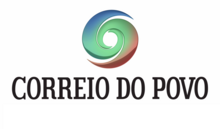Correio do Povo

The one hundred years old newspaper Correio do Povo’s foundation and transformations demonstrate the well-stablished relations between media ownership, politics, industry and religion in Brazil. Sergipe journalist Francisco Antônio Caldas Júnior founded the Correio do Povo with the purpose of keeping a distance from dominant political positions in Rio Grande do Sul by the end of the 19th century. That ideal was expressed even in the publication’s color, pink, to oppose the federalists (maragatos, who wore a red scarf) and the republicans led by the then governor Júlio de Castilhos (the pica-paus [woodpeckers], who wanted an independent country and wore white scarfs). While the newspaper didn’t stand for any political party, they had connections with southerner ranchers, the state’s agrarian elite.
The newspaper established a period of professionalism in the Rio Grande do Sul press, and had important collaborators such as the writer Mario Quintana. With the founder’s death in 1913, however, the newspaper established ambiguous relations with political groups. In 1928, with the approximation between different Rio Grande do Sul parties around Getúlio Vargas inauguration as state governor and his candidacy to the Republic’s presidency, the newspaper supported Vargas, which caused conflicts between Francisco Antônio’s son, Francisco Caldas, who wished to maintain the independent profile created by his father, and Dolores Caldas, widow of the Correio do Povo’s founder.
Thus, the Correio do Povo supported the 1930 revolution which made Getúlio Vargas President of the Republic. Years later, however, they became an opposition to the provisional government, which received as an answer an advertisement boycott by the government and a sales prohibition in places like railroads. In 1935, Breno Caldas, son of Francisco Antônio and Dolores, became the newspaper’s director and attempted to keep a distance from political parties UDN (National Democratic Union) and PSD (Social Democratic Party), although they seemed to favor the PSD candidate, Eurico Gaspar Dutra, elected in 1945. They also supported the ban of the PCB (Brazilian Communist Party) in 1947.
The Caldas Júnior family formed a communications group when they incorporated other vehicles: the newspapers Folha da Tarde (1936-1984) and Folha da Manhã (1969-1982), Rádio Guaíba (1957) and TV Guaíba (1979). In 1961 Rádio Guaíba was used by the state governor Leonel Brizola to disseminate the “Cadeia da Legalidade” ('Legality chain'), a campaign for the defense of vice president João Goulart’s assuming of the presidency after the resignation of president Jânio Quadros.
However, the newspaper Correio do Povo didn’t support Goulart’s presidency, taking the opposite stance. Three years later the Correio do Povo supported the military coup that deposed President João Goulart and originated the Civilian-Military Dictatorship (1964-1985), inaugurating an era of censorship of media outlets which ended up affecting the newspaper itself. With the debts generated by the high investments on TV Guaíba and lack of governmental support, the newspaper, rival to the Zero Hora newspaper of Grupo RBS, stopped circulating between 1984 and 1986. The group’s debts led Caldas Júnior to selling his communication outlets to agroindustry and real estate enterpreneur Renato Bastos Ribeiro, shareholding controller of soy producer Incobrasa Industries, Ltd. Ribeiro invested in the Correio do Povo and in the TV Guaíba channel, but closed Folha da Manhã and Folha da Tarde activities.
In 2007, the group’s communication outlets were again sold, this time to Rede Record, owned by bishop Edir Macedo, leader of the Igreja Universal do Reino de Deus (IURD - Universal Church of the Kingdom of God) for about R$100 millions, according to information publicized by Folha de S. Paulo (9/15/2007). Macedo maintained the newspaper editorial line, as he did with other Grupo Record commercial outlets. The sale was questioned by the Rio Grande do Sul Professional Journalists Union (Aguiar, 2015). Brazilian legislation determines that broadcasting companies can only operate through public concession, that is, the selling of radio stations and TV channels would be forbidden, and when the concession operator no longer wishes or is no longer able to operate, he should give the concession back to the Ministry of Communications, which would start a new granting process. However, this practice is common in Brazil, not only in the case of the Caldas Júnior group companies, but also with different outlets and groups' profiles listed in this research.
The newspaper has a tabloid format and is sold predominantly in the southern region of Brazil. As most of the region’s communcation subsystems, they adress national and international themes, but with a local viewpoint and an emphasis on regional issues. The internet portal’s slogan is “Portal de notícias dos gaúchos” (“Newsportal for the Rio Grande do Sul people”). The portal displays different news sections: Economy, Education, World, Police, Politics and Rural. They still have sports sections for Rio Grande do Sul’s soccer clubs Grêmio and Internacional, Soccer and Other Sports. The culture sections are divided by artistic languages: Film, Exhibitions, Literature, Fashion, Music, Theater and TV, besides the section Gente ('People'), focusing on agents related to each of the other sectors.
The blogs hosted on the website, unlike other national online portals, emphasize the themes rather than the authors. There are blogs about pets, cars and motorcycles, careers, Formula 1, pop culture, photography, film, books, interviews with contemporary artists, a section similar to “female magazines” and another aimed at the youth, besides regional sections about cities in Rio Grande do Sul and gaucho traditions. The only signed columns are sports journalist Hilton Monbach’s, writer, playwright and military police officer (“brigadista”) Oscar Bessi Filho’s and journalist, historian and sociologist Juremir Machado Silva’s, who also coordinates the Communication graduate course ate Pontifícia Universidade Católica do Rio Grande do Sul (PUC-RS). The portal also has an e-mail service and an archive with content published by the newspaper since June 1997.
Audience Share
2.76% (IVC)
Ownership Type
private
Geographic Coverage
Multi-territorial media
Content Type
Paid content (tabloid)
Media Companies / Groups
Grupo Record
Ownership Structure
Correio do Povo belongs to Grupo Record. The group is owned by the Macedo family.
Group / Individual Owner
General Information
Founding Year
1895
Founder
Francisco Antônio Vieira Caldas Júnior - journalist and businessman. He had relations with the agrarian elite of Rio Grande do Sul.
Ceo
Reinaldo Gilli - since 2014, is president of Grupo Record Sul. Gilli is a partner of seven companies of Grupo Record.
Editor-In-Chief
Eugenio Bortolon - editor-in-chief since 2015.
Contact
Sede Porto Alegre (RS): Endereço: Rua Caldas Junior, 219 – Centro / Porto Alegre - RS – 90019-900 / Fone: (51) 3215-6111 / E-mail: atendimento@correiodopovo.com.br / Site: www.correiodopovo.com.br .
Financial Information
Revenue (in Mill. $)
Missing Data
Operating Profit (in Mill. $)
Missing Data
Advertising (in % of total funding)
Missing Data
Market Share
Missing Data
Further Information
Sources
http://www.correiodopovo.com.br/




